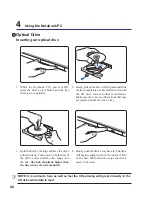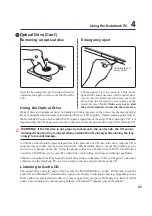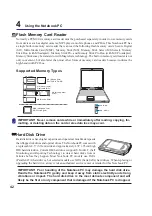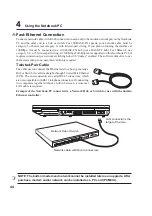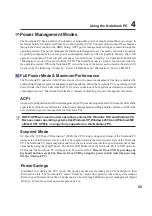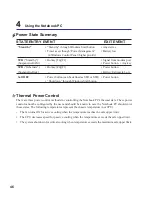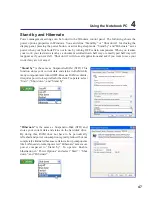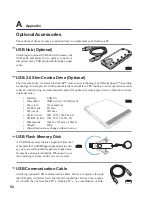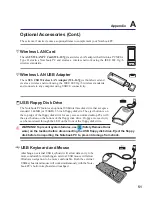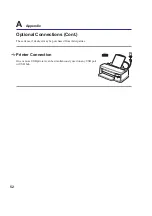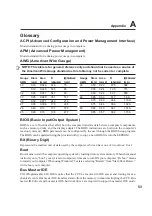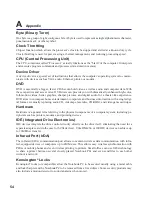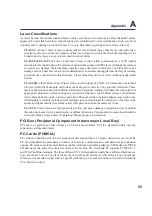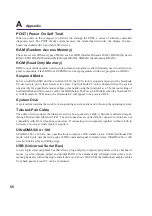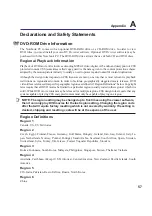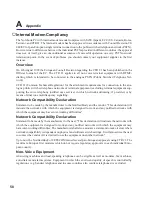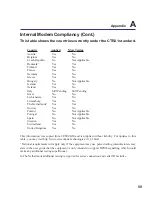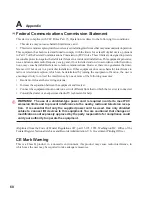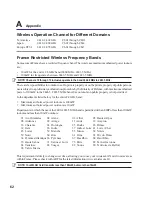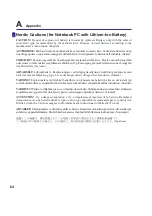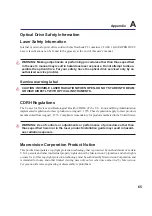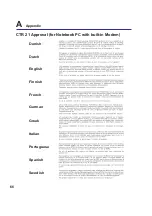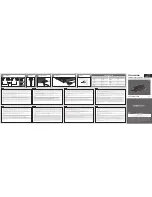
54
A
Appendix
Byte (Binary Term)
One byte is a group of eight contiguous bits. A byte is used to represent a single alphanumeric character,
punctuation mark, or other symbol.
Clock Throttling
Chipset function which allows the processor’s clock to be stopped and started at a known duty cycle.
Clock throttling is used for power savings, thermal management, and reducing processing speed.
CPU (Central Processing Unit)
The CPU, sometimes called “Processor,” actually functions as the “brain” of the computer. It interprets
and executes program commands and processes data stored in memory.
Device Driver
A device driver is a special set of instructions that allows the computer’s operating system to commu-
nicate with devices such as VGA, audio, Ethernet, printer, or modem.
DVD
DVD is essentially a bigger, faster CD that can hold video as well as audio and computer data. With
these capacities and access rates, DVD discs can provide you with dramatically-enhanced high-color,
full-motion videos, better graphics, sharper pictures, and digital audio for a theater-like experience.
DVD aims to encompass home entertainment, computers, and business information with a single digi-
tal format, eventually replacing audio CD, videotape, laserdisc, CD-ROM, and video game cartridges.
Hardware
Hardware is a general term referring to the physical components of a computer system, including pe-
ripherals such as printers, modems, and pointing devices.
IDE (Integrated Drive Electronics)
IDE devices integrate the drive control circuitry directly on the drive itself, eliminating the need for a
separate adapter card (in the case for SCSI devices). UltraDMA/66 or 100 IDE devices can achieve up
to 33MB/Sec transfer.
Infrared Port (IrDA)
The infrared (IrDA) communication port allows convenient wireless data communication with infra-
red-equipped devices or computers up to 4Mbits/sec. This allows easy wireless synchronization with
PDAs or mobile phones and even wireless printing to printers. Small offices can use IrDA technology
to share a printer between several closely placed Notebook PCs and even send files to each other
without a network.
Kensington
®
Locks
Kensington
®
locks (or compatible) allow the Notebook PC to be secured usually using a metal cable
and lock that prevent the Notebook PC to be removed from a fixed object. Some security products may
also include a motion detector to sound an alarm when moved.
Summary of Contents for Z94G
Page 1: ...Notebook PC Hardware User s Manual E2219 Nov 2005 ...
Page 4: ...4 Contents ...
Page 10: ...10 1 Introducing the Notebook PC ...
Page 11: ...11 2 Knowing the Parts Basic sides of the Notebook PC ...
Page 32: ...32 3 Getting Started ...
Page 48: ...48 4 Using the Notebook PC ...
Page 67: ...67 Appendix A ...

